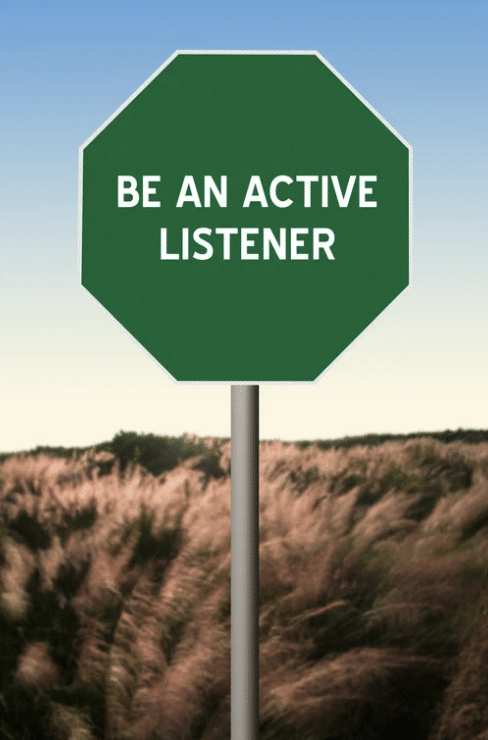Listener Type
Listening is the foundation of effective coaching. It builds trust, strengthens relationships, and helps clients feel truly seen and heard. But did you know there are different types of listeners—and that recognizing your dominant style can enhance how you show up as a coach?

Whether you’re discovering your coaching niche or refining your approach, becoming aware of your listener type is a powerful step toward deeper connection and more transformative client outcomes. And just like any coaching skill, listening takes practice.
So—what kind of listener are you?
Active Listener
Active listeners focus on both what is being said and how it’s being communicated. They pay close attention to body language, tone, and facial expressions, and they ask meaningful questions that show interest and spark deeper conversation.
People generally think of active listening when aiming to improve their communication skills. Active listeners are fully present. They avoid distractions, resist the urge to interrupt, and wait until the speaker has finished before responding.
For health coaches, active listening is essential. It builds the foundation of trust, safety, and presence that allows clients to open up, reflect, and take empowered steps forward.

Critical Listener
Critical listeners are natural analyzers. They evaluate what they’re hearing in real time, using logic and reasoning to assess meaning, context, and potential implications. They often ask clarifying questions to ensure they fully understand before offering feedback.
Though sometimes viewed as more “cerebral,” critical listening can be incredibly valuable in coaching—especially when helping clients sift through conflicting information or identify root causes of challenges. Critical listeners are attuned to tone, subtext, and what isn’t being said, making them strong allies during difficult conversations.
In a coaching context, critical listening supports strategic thinking, collaborative problem-solving, and the development of well-aligned wellness plans.
Informational Listener
Informational listeners are focused on comprehension. Their goal is to absorb, retain, and understand key facts and ideas—often through note-taking or observation. This type of listening is especially useful during training or when learning new material.
For coaches, informational listening is invaluable when collaborating with other professionals, attending continuing education events, or supporting clients with complex medical histories. It’s less about offering feedback and more about understanding thoroughly.
Coaches who excel at informational listening often become trusted knowledge hubs—able to translate complex insights into meaningful, actionable guidance.

Sympathetic Listener
Sympathetic listeners tune into emotion as much as content. They notice subtle cues in body language, eye contact, and vocal tone—and respond with kindness and care. Their focus is on feeling with the speaker, acknowledging emotional experiences without rushing to fix or solve.
This type of listening sits at the intersection of active and critical listening. Sympathetic listeners analyze emotion and context, yet remain open and nonjudgmental. They excel at helping others feel validated, heard, and supported.
In health coaching, this ability to recognize and honor emotion allows coaches to meet clients where they are, creating a foundation of empathy and trust that supports transformation.
Empathetic Listener
Empathetic listeners take sympathetic listening a step further. They step into the speaker’s shoes—seeing the world from their perspective without judgment or assumption. They’re highly attuned to subtle emotional shifts and often reflect back what they’ve heard to show understanding and deepen connection.
This is a core coaching skill. Empathetic listeners use reflective statements, open-ended questions, and compassionate silence to hold space for vulnerability. Their nonjudgmental presence helps clients feel safe expressing fears, frustrations, or challenges.
Empathetic listening empowers clients to explore their experience fully—an essential part of the healing and goal-setting process.

What Listener Type Are You?
Every coach brings a unique listening style to their sessions. Identifying yours can help you amplify your strengths and expand your toolkit. You may find you use different listening types depending on the context—and that’s okay. In fact, great coaches learn to shift between styles to meet their clients’ evolving needs.
The more intentionally you listen, the more impactful your coaching becomes.
If you are unsure about which type of listener you are, or you just want to have a little fun, take our listener type quiz.
Deepening Your Listening Practice
Understanding your listener type is a valuable first step—but listening is more than a category. It’s a skill, a mindset, and a daily practice. True listening is about presence. It’s how we show care, create trust, and form meaningful connections.
As David W. Augsberger says, “Being heard is so close to being loved that for the average person, they are almost indistinguishable.” And yet, few of us have ever been taught how to listen in a way that truly honors what someone else is saying.
Here are five simple but powerful questions to help you reflect on how you listen—and how you might deepen your awareness:
- Are you listening to the other person—or to yourself? Are you truly present, or already forming your response while they speak?
- Are you listening only to their words? Listening for content alone may miss the emotion or meaning behind what’s being shared.
- Are you listening for context? Consider tone, body language, environment, and emotion. These often shape the message more than the words themselves.
- Are you listening to what’s left unsaid? Pauses, hesitations, or what isn’t voiced can be just as telling as what is.
- Are you listening for the full meaning? This highest level of listening integrates words, nonverbal cues, unspoken truths, and emotional resonance.
Deep listening takes time, intention, and practice—but it’s one of the most powerful tools a health coach can cultivate. When clients feel heard, they feel safe. And when they feel safe, change becomes possible.
Listening at the Heart of Client-Led Coaching
Listening isn’t just a skill—it’s the foundation of client-led coaching. In this solo episode of Health Coach Talk, Dr. Sandi explores why truly listening to and empowering clients is what makes coaching so effective. She contrasts the health coach’s approach with doctors and AI-driven platforms and shares how self-efficacy and transformation are built through meaningful, client-centered connection.
🎧 Listen to Episode 128: How Client-Led Coaching Transforms Lives
📺 Watch below or read the full blog and show notes here.
What Makes A Great Health Coach?
Great health coaches do more than listen—they ask the right questions, hold space without judgment, and guide clients with empathy, curiosity, and care. If you’re inspired to sharpen your skills and make a greater impact, explore our article What Makes a Great Health Coach? for key traits and insights from experienced coaches.
Want to take your next step?
The Functional Medicine Coaching Academy offers world-class training rooted in behavior change, functional medicine, and personalized wellness. Learn more about our Health Coach Certification Program here.
Our Latest Blogs
-

Would You Be a Good Health Coach?
Read Full Article: Would You Be a Good Health Coach? -

Food Sensitivity Testing 101: Supporting Clients with Inflammation and Gut Issues
Read Full Article: Food Sensitivity Testing 101: Supporting Clients with Inflammation and Gut Issues -

Protein 101: The Health Coach’s Guide
Read Full Article: Protein 101: The Health Coach’s Guide

